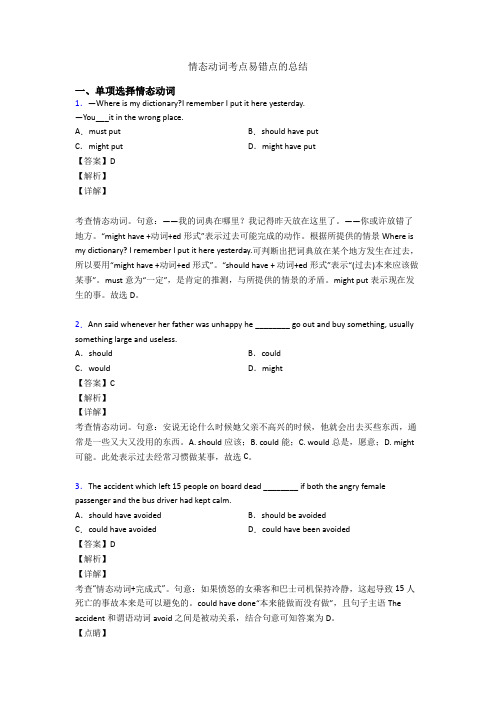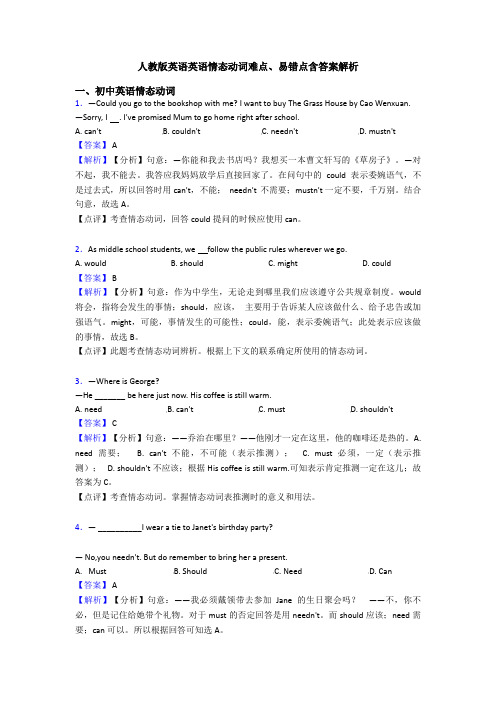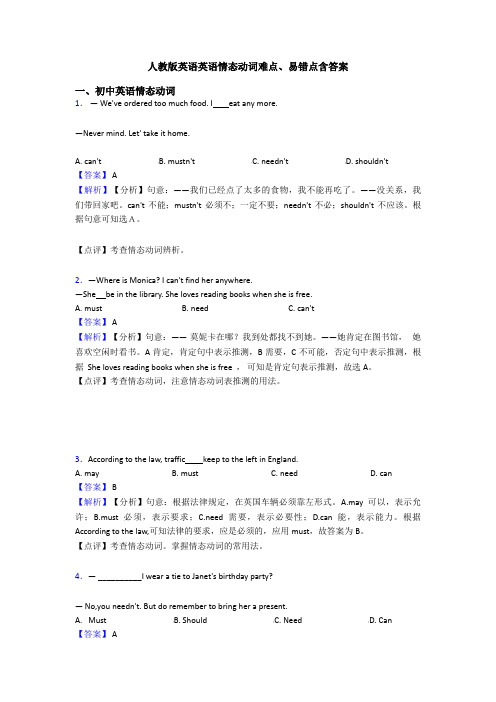【英语】情态动词考点易错点的总结
情态动词考点易错点的总结

情态动词考点易错点的总结一、单项选择情态动词1.I’m sorry, but you _____ go wrong. There’s no such man here.A.need B.can C.must D.will【答案】C【解析】【详解】考查情态动词。
句意:很抱歉,但是你一定是弄错了。
这儿没有这么个人。
A. need需要;B. can能够;C. must必须;D. will将会。
must指有把握的推测,“一定;必定”,结合下文There’s no such man here.可知一定是弄错了。
故选C。
2.-- Did Jim come?-- I don’t know. He _______ while I was out.A.might have come B.might comeC.must have come D.should have come【答案】A【解析】【详解】考查情态动词推测用法。
句意:Jim来了吗?--我不知道,在我不在的时候,可能来过。
根据前文I don’t know.可知,说话者不知道Jim来没来,因此后文推测来过,但是语气很不确定,故可知选A。
对过去情况的推测为情态动词+have done,must have done 一定做了某事,should have done 应该来过,不符合,故选A。
【点睛】情态动词+have+过去分词的用法,表示推测或判断过去的情况。
can/could+have+过去分词用法:①多用于否定句和疑问句中。
表示对过去某事发生的可能性的否定或质疑,意为:不可能(已经)......了-(否定句)/可能(已经)......了嘛?-(疑问句)②用于肯定句中。
表示对过去没有做某事的遗憾,含有轻微的责备,意为:本来可以......的(但实际上没有......)。
You could have done better, but you were too careless.(肯定句。
【英语】情态动词总结以及易错点

【英语】情态动词总结以及易错点一、单项选择情态动词1.Look! There are so many mistakes in your composition. You ________ have fixed full attention on it.A.can B.shouldC.need D.might【答案】B【解析】【详解】考查情态动词。
句意:看!你的作文里有那么多的错误。
你本应该把所有的注意力都集中在它上面的。
表示“本应该做但实际上没有做”应该用should have done结构,can have done 表示可能;need表示需要;might have done表示可能做过某事;故选B。
2.Using AI, many companies are now conducting experiments that__________ possible just a few years ago.A.would have been B.might have beenC.shouldn't have been D.couldn't have been【答案】D【解析】【详解】考查情态动词表推测。
句意:很多公司现在使用人工智能进行试验,这在几年前是不可能的。
根据“a few years ago”可知,此处表示“过去不可能”,应该用couldn’t have done,故D 项正确。
3.Mr. Baker, some students want to see you. ______ they wait here or outside?A.May B.Should C.Shall D.Will【答案】C【解析】【详解】考查Shall的用法。
句意:贝克先生,有些学生想见你。
他们是在这里等还是在外面等?Shall用于第一、第三人称疑问句中,表示说话人征求对方的意见或向对方请示。
故选C。
备战2024年高考英语考试易错点09 情态动词和虚拟语气(4大陷阱)(解析版)

易错点09情态动词和虚拟语气目录01易错陷阱(4大陷阱)02举一反三【易错点提醒一】情态动词基本用法易混易错点【易错点提醒二】情态动词表判断推测易混易错点【易错点提醒三】情态动词后+have done易混易错点【易错点提醒四】虚拟语气易混易错点03易错题通关易错陷阱1:情态动词基本用法易混易错点。
【分析】功能:情态动词不能单独作谓语,后跟动词原形共同构成谓语。
形式:情态动词没有人称和数的变化。
否定形式是多数情态动词的否定式是在情态动词的后面加not。
时态:个别情态动词有现在式和过去式两种形式,过去式用来表达更加客气、委婉的语气。
位置:情态动词在谓语之前;谓语动词前若有助动词,则在助动词之前。
疑问句中在主语之前。
【高频考点】1.can/could表能力、请求、可能性(表示可能性用于否定句及疑问句中);特殊句型:can not...too.../enough(再怎么……也不过分)、can't help but do sth.(不得不做某事)、can't wait to do sth.(迫不及待地做某事)。
2.may/might表较小的可能性;表示请求许可以及祝愿。
句型和搭配:may/might as well do表示“还是……好;最好……”;may well do表示“很可能”;may可以用来表示祝愿,用“may+主语+动词原形”结构。
May you succeed.祝你成功。
3.must表示非常肯定的推测;表“偏要;非要……不可”;mustn't意为“禁止”,表示“不必”应用needn't。
4.shall的用法用于第二、三人称的陈述句中,表命令、警告、许诺或威胁等,语气强于should;用于第一、三人称的疑问句中,表示征询意见。
5.should/ought toshould表责任、义务、劝告、建议等,意为“应该”,还可表出乎意料的语气,意为“竟然”;ought to表义务或责任,意为“应该”。
情态动词考点易错点的总结

【解析】
【详解】
【详解】
考查情态动词。句意:所有学生们应在去学校之前带上口罩以防感染非典病毒,这已经被宣布。shall用于第二、第三人称,表示说话人给对方命令、警告、允诺或威胁,故选A项。
10.Mark ______ have hurried. After driving at top speed, he arrived half an hour early.
A.needn’tB.wouldn’tC.mustn’tD.couldn’t
【答案】A
【解析】
考查情态动词。need’t have done本不必要做某事,句意:迈克本不必要着急的。他以全速驾驶后,他早到了半个小时。wouldn’t不会,mustn’t禁止,couldn’t不可能,所以选A。
I guess the poet would have been about twenty when she wrote her first poem.
Another worker wouldn't have acted like that.
4.One of our rules is that every student _______ wear school uniform while at school.
He oughtn't to / shouldn't have done that.他本来就不该做那件事.(可是做了)
6.“would+have+过去分词”表示对过去的某种情况进行猜测,或本来要做某事却因某种原因未做成,通常用来说明某一情况,但不像用should或ought to那样含有责备之意。如:
5.“should / ought to + have +过去分词”表示过去本该做某事但没做,其否定式表示过去不该做某事但做了,这种句式含有不满或责备之意,ought to的语气比should强一些。如:
人教版英语英语情态动词难点、易错点含答案解析

人教版英语英语情态动词难点、易错点含答案解析一、初中英语情态动词1.—Could you go to the bookshop with me? I want to buy The Grass House by Cao Wenxuan.—Sorry, I . I've promised Mum to go home right after school.A. can'tB. couldn'tC. needn'tD. mustn't【答案】 A【解析】【分析】句意:—你能和我去书店吗?我想买一本曹文轩写的《草房子》。
—对不起,我不能去。
我答应我妈妈放学后直接回家了。
在问句中的could表示委婉语气,不是过去式,所以回答时用can't,不能;needn't 不需要;mustn't一定不要,千万别。
结合句意,故选A。
【点评】考查情态动词,回答could提问的时候应使用can。
2.As middle school students, we follow the public rules wherever we go.A. wouldB. shouldC. mightD. could【答案】 B【解析】【分析】句意:作为中学生,无论走到哪里我们应该遵守公共规章制度。
would 将会,指将会发生的事情;should,应该,主要用于告诉某人应该做什么、给予忠告或加强语气。
might,可能,事情发生的可能性;could,能,表示委婉语气;此处表示应该做的事情,故选B。
【点评】此题考查情态动词辨析。
根据上下文的联系确定所使用的情态动词。
3.—Where is George?—He _______ be here just now. His coffee is still warm.A. needB. can'tC. mustD. shouldn't【答案】 C【解析】【分析】句意:——乔治在哪里?——他刚才一定在这里,他的咖啡还是热的。
情态动词考点易错点的总结

情态动词考点易错点的总结一、选择题1.We shouldn’t throw any objects from the building. Even a small object ________ cause serious injuries or death, when dropped from a great height.A.must B.should C.may D.need 2.Think twice before making a decision, or you __________ get into trouble.A.may B.can't C.shouldn't D.mustn't 3.—I must go to school today, ________?—No, you ________.You can go as soon as you get well.A.mustn’t I;needn’t B.needn’t I;needn’tC.mustn’t I;mustn’t D.needn’t I;mustn’t4.—How do you like my new dress?—Well, if I ________ say, it is not suitable for you.A.may B.must C.have to D.should 5.—Must the children leave at six tomorrow morning?—No, they _______. They can have more time to get ready for the trip.A.can’t B.needn’t C.mustn’t D.may not 6.— Wh y didn’t you tell it to me earlier?— Why ________ I? I want to have my own secret.A.can B.may C.should D.shall 7.—Mum, why do I have to wear a mask before entering the supermarket?—For your health and safety, you ________ be too careful.A.shouldn’t B.c an’t C.mustn’t D.needn’t 8.—There is a knock at the door.—It ________ be my mom. She always comes back home at this time.A.may B.may not C.must D.can’t 9.Hurry up, or we ________ miss the beginning of the film.A.should B.must C.may D.have to 10.—Will my car be ready by the end of the day?—It ________ be, sir. I’ll call if there’s any problem.A.must B.could C.shall D.should 11.—Who is singing next door? It sounds like a young girl’s voice.—It _________ be Jane. But she seldom sings English songs.A.need B.must C.may D.can 12.—Dad, must we wait until the light becomes green?—Yes, I am afraid we ________. That’s the traffic rule.A.may B.can C.have to D.need 13.— Is Lang Lang going to perform at Art Center this Friday?— Yes. It ________ be him. He has been here for three days.A.might B.must C.mustn’t D.may 14.It’s amazing that the pen ________turn voice into text with few mistakes.A.can B.must C.may D.need 15.—Have you decided to take up teaching as career after graduation?—I ________ go abroad for further education instead. But it depends.A.must B.should C.may D.shall16.Please don't make so much noise. I ________ hear the speaker very well.A.needn't B.can't C.shouldn't D.mustn't 17.—Amy, I hear you've got many foreign coins._______ I have a look?—Of course, I'll fetch them for you.A.May B.MustC.Should D.Need18.When I was young, my father ___________ take me to climb the hill which was not far from our house.A.may B.must C.would D.should 19.—Shall we go camping this summer holiday?—Nothing________be better.A.should B.could C.must D.may20.—Be careful! Fire ________ be dangerous sometimes.—OK. I will put it out right away.A.mustn’t B.should C.can D.needn’t 21.Look at the floor, Tom! ________ you watch TV while having a meal?A.Should B.Could C.Must D.May22.— Listen! Tom ________ be listening to the music while doing his homework.—Let’s go upstairs to remind him to turn it off.A.should B.could C.would D.must 23.—Must I finish all my homework today, Mum?—No, you ________, my dear. You can finish some tomorrow if you like.A.needn’t B.shouldn’t C.can’t D.mustn’t24.We've discussed every detail of this plan and have got everything ready. But still something ________ go wrong. We still have to be very careful.A.must B.should C.would D.may25.—Will Jim come to Yangzhou for a holiday?—He ________come and it depends on how much homework he will have.A.may B.should C.must D.need26.—Is it usually warm in Yancheng in May?—Yes. But it _______ be rather cold sometimes.A.must B.should C.would D.can27.— Is the boy over there Tom? He often wears a jacket like that.— It _______ be him. He is absent from school today.A.needn’t B.shouldn’t C.mustn’t D.can’t28.When people are waiting at the zebra crossing, cars and buses ________ wait and let them go first.A.must B.may C.can D.need29.You ________ require others to do with the problem like you. Everyone has his own way. A.mustn’t B.needn’t C.may not D.shouldn’t 30.—Must we stop the Japanese government discharging nuclear waste water (排放核污水) into the Pacific Ocean?—________. Because everyone should protect our earth and it is bad ________ us to eat the polluted seafood and drink the waste water.A.Yes, we can; of B.No, we mustn’t; of C.Yes, we must; for D.No, we needn’t; for 31.A hard-working man ________ become a great scientist, but a great scientist ________ be a hard-working man.A.can’t; can B.may not; must C.can’t; must D.may not; can 32.—Excuse me. I haven’t finished reading the book yet. May I keep it a bit longer?— Sorry, you ________. You must return it on time.A.needn’t B.can’t C.won’t D.shouldn’t 33.Sometimes smiles ________ be false, hiding other feelings like anger, fear or worry. A.should B.would C.must D.can34.For the safety of the passengers, objects like guns ________ be carried on board.A.may not B.needn’t C.might not D.mustn’t 35.—The article says that a person’s animal sign decides his personality.—You ________ read it for fun, but don’t believe in that.A.can B.must C.shouldn’t D.needn’t 36.—Mum, I bought some strawberries on my way home.—Oh, you’re so sweet. But the strawberries ________ be put into the fridge for freshness. A.must B.can C.may D.need37.—May I have some wine to drink?—No, you ________. You have to drive home later.A.mustn’t B.needn’t C.can’t D.may not38.You ________ drive after drinking alcohol(酒). It’s against the law.A.mustn’t B.needn’t C.couldn’t D.wouldn’t39.—Is it really necessary for me to go shopping with a mask on?—I’m afraid you ________ in public. It is not only to protect yourself but also to protect others. A.must B.should C.can D.need40.—Shall I tell him the change of the time right now?—I’m afraid you ________, otherwise he will be late for the meeting.A.can B.may C.must D.need【参考答案】一、选择题1.C【详解】句意:我们不应该从大楼上扔任何物体。
人教版英语英语情态动词难点、易错点含答案

人教版英语英语情态动词难点、易错点含答案一、初中英语情态动词1.— We've ordered too much food. I eat any more.—Never mind. Let' take it home.A. can'tB. mustn'tC. needn'tD. shouldn't【答案】 A【解析】【分析】句意:——我们已经点了太多的食物,我不能再吃了。
——没关系,我们带回家吧。
can't不能;mustn't必须不;一定不要;needn't不必;shouldn't不应该。
根据句意可知选A。
【点评】考查情态动词辨析。
2.—Where is Monica? I can't find her anywhere.—She be in the library. She loves reading books when she is free.A. mustB. needC. can't【答案】 A【解析】【分析】句意:——莫妮卡在哪?我到处都找不到她。
——她肯定在图书馆,她喜欢空闲时看书。
A肯定,肯定句中表示推测,B需要,C不可能,否定句中表示推测,根据 She loves reading books when she is free ,可知是肯定句表示推测,故选A。
【点评】考查情态动词,注意情态动词表推测的用法。
3.According to the law, traffic keep to the left in England.A. mayB. mustC. needD. can【答案】 B【解析】【分析】句意:根据法律规定,在英国车辆必须靠左形式。
A.may可以,表示允许;B.must必须,表示要求;C.need需要,表示必要性;D.can能,表示能力。
根据According to the law,可知法律的要求,应是必须的,应用must,故答案为B。
(完整版)情态动词中考重难点及易错点

Part 4 【语法】の情态动词重难点及易错点情态动词+动词原形情态动词表允许及其回答情态动词表猜测【情态动词表允许】1、请求允许做某事时,can最常用,在没有把握或为表现得更客气一些时,可用could;而may比can 更正式一些,且多用于第一人称Could I watch TV?Can you find a seat for me?May I use your phone?2、当允许某人做某事时,要用can和may,不用could 和might.Could I borrow your computer? Yes, of course you can.Might I trouble you for a light? Yes, you may.3、常考易错点:对情态动词表请求的回答:肯定:Sure. 否定:You’d better not.Certainly. I’m afraid not.Yes, do please. I’m sorry, but you can’t/mustn’t.No problem.That’s OK/all right.Yes, you can/may.With pleasure.4、例:May I smoke here? Sorry, but you mustn’tMust I go home before 8 o’clock?No, you needn’t/don’t have to .Need I go? Yes, you must. / No, you needn’t.Would you mind.... if I smoke here? Yes, you’d better no t. / No, of course not.【情态动词表猜测】肯定:must >can>may否定:can’t > may not一定是;肯定是________; 可能是________;一定不是;不可能是________; 可能不是________;【针对练习】( ) 1. "________ I take it out?" "I'm sorry, you ________."A. Could ...couldn'tB. Might...might notC. Could ...canD. May...can't ( ) 2. "Need we do this job now?" "Yes, ________."A. you needB. you shouldC. you mustD. you can( ) 3. He said that you ________ watch TV all the evening if you wished.A. mayB. mustC. canD. might( ) 4. Peter ________ come with us tonight, but he isn't very sure yet.A. mustB. canC. mayD. will( ) 5. Michael ________ be a policeman, for he's much too short.A. needn'tB. can'tC. shouldn'tD. won't( ) 6. Come on! We ________ hurry because there isn't much time left.A. mayB. mustC. canD. need( ) 7. ---Do you mind if I turn on the TV?---________. My father is sleeping.A. Better not.B. No, not at all.C. No, I don’t mind.D. That’s all right. ( ) 8. ---Would you mind my sitting next to you?---________.A. No, of course not.B. No, you can’t.C. Yes, please.D. Yes, go ahead. ( ) 9. ---Would you please pass me today’s paper?---________.A. Yes, please.B. Here you are.C. You are welcome.D. I think so. ( ) 10. ---"Could I call you by your first name?"---"Yes, you________."A. willB. couldC. mayD. might( ) 11. I wasn't sure whether I ________offer to help or not.A. shouldB. mightC. wouldD. needed ( ) 11. There ________ too much noise in a hospital.A. should haveB. shouldn't haveC. ought to beD. oughtn't to be( ) 12. Albert is too fat. She ________ eat too much sweet.A. had better notB. shouldC. ought toD. ought to not ( ) 13. --- ________ they better wait here, sir?---No, they ________.A. Do; don'tB. Had; hadn'tC. Had; don'tD. Had; had ( ) 14.--Excuse me, sir! Can I finish my homework tomorrow morning?--- Oh, no. It ________ be finished tonight,A. wouldB. shouldC. couldD. can( ) 15.You had better________ your job on timeA. finishingB.to finishC. finishD. finished BABBC【巩固练习】( ) 12. -Is John coming by train?--He should, but he ________ not. He likes driving his car.A. mustB. canC. needD. may( ) 13. I thought you ________ be hungry, so I have brought you some cakes.A. mayB. mightC. canD. could( ) 14. ---Could you please help me choose an MP4 player online?---________. My computer doesn’t work.A. I don’t care.B. I hope so.C. I’m afraid not.( ) 15. ---Would you mind if I sit here?---________. It’s for Miss Zhang.A. Better not.B. Never mind.C. Not at all.D. Of course not.( ) 16. You ________walk for miles and miles among the hills without meeting anyone if you go there.A. mustB. needC. mayD. should DCDDC BBBAC AABCCA【中考链接】( ) 1. To keep children safe, we ___________ put the things like knives and medicine away in our house. (2017广东中考)A. mayB. shouldC. canD. might( ) 2. ---Mum, ____ I visit the Modern Art Museum next Monday? (2016广东中考) ---I’m afraid you can’t. All the museums in this city are closed on Monday.A. wouldB. needC. shouldD. may( ) 3. --- ________ I hand in the report today? (2017北京中考)--- No, you needn’t.A. CanB. MustC. ShallD. Could( ) 4. ---________ I park my car here for a while? (2017上海中考)---No, you mustn’t. Do you see the sign“NO PARKING”?A. WouldB. MayC. MustD. Should( ) 5. ---Must I prepare for the trip today? (2017哈尔滨中考)--- No, you _________ prepare for it today. You can do it tomorrow.A. needB. don’t needC. needn't( ) 6. ---Many people play with mobile phones all day instead of reading books.---That’s too bad. Everyone ________ be a book lover. Reading is more enjoyable. (2016山西中考)A. mayB. shouldC. would( ) 7. ---Mum, ________I play football this afternoon? (2016天津中考) ---Sure, but you ________ finish your homework first.A. may; couldB. can; mustC. can; mustn’tD. may; can’t。
- 1、下载文档前请自行甄别文档内容的完整性,平台不提供额外的编辑、内容补充、找答案等附加服务。
- 2、"仅部分预览"的文档,不可在线预览部分如存在完整性等问题,可反馈申请退款(可完整预览的文档不适用该条件!)。
- 3、如文档侵犯您的权益,请联系客服反馈,我们会尽快为您处理(人工客服工作时间:9:00-18:30)。
【英语】情态动词考点易错点的总结一、单项选择情态动词1.I still find it hard to imagine that such a clever child __________ make such a foolish mistake. A.shall B.mustC.can D.should【答案】D【解析】【详解】考查情态动词。
句意:我仍然难以想象这样聪明的孩子竟然犯这样愚蠢的错误。
should 作为情态动词,可以用来表示意外、惊喜或者在说话人看来是不可思议的,常常译为"竟会"、"居然",这么聪明的孩子竟然犯这样愚蠢的错误。
表示意外,shall表示允诺,命令等,must表示必须,can表示能力及可能性。
所以答案选D。
2.Paul did a great job in the speech contest. He many times last week.A.need have practised B.might practiseC.must have practised D.could practise【答案】C【解析】【详解】考查情态动词。
句意:保罗在演讲比赛中表现得很好。
他上星期一定练习了很多次。
must have done是对过去发生的动作最有把握的猜测,意思是“一定”。
故C选项正确。
3.It has been announced that all the candidates ___________ remain in their seats until all the papers have been collected.A.shall B.couldC.would D.ought【答案】A【解析】【详解】考查情态动词用法。
句意:据宣布,所有的候选人都要坐在位置上,直到所有的试卷都被收齐。
根据句意可知本句是考试规则,情态动词shall可以表示“按照规则/规定/法律要做的事情”,符合本句语境。
故A项正确。
4.—It’s really great to have a computer to store my photos.—Don’t count on it too much. It ________ break down and you’d better make a copy of them. A.must B.canC.should D.will【答案】B【解析】考查情态动词。
句意:——有一台计算机来储存照片真是太棒了。
——不要过度依赖它。
它有时候也会出故障,你最好做一个备份。
计算机出故障这是可能的事情,表示客观可能性用can。
must肯定,必须;should应该;will表意愿。
故B选项正确。
5.He is a bad-tempered fellow, but he ________ be quite charming when he wishes.A.shall B.shouldC.can D.must【答案】C【解析】【详解】考查情态动词辨析。
句意:他是个脾气不好的家伙,但当他希望自己有魅力的时候,他可以变得相当可爱。
此处表示“能、可以”,故C项正确。
6.The room is so clean. He ________ have cleaned it yesterday evening.A.will B.needC.can D.must【答案】D【解析】【详解】考查情态动词表推测。
句意:房间如此干净,他一定是昨天晚上打扫过了。
must have done 表示对过去发生的事情有把握的猜测,意思是“一定(做过)”,故D项正确。
7.— Excuse me, do you mind if I open the window?— Well, if you __________. I can put on more clothes.A.can B.mayC.must D.shall【答案】C【解析】【详解】考查情态动词。
句意:-不好意思,我把窗户打开你介意吗?- 好吧,如果你必须这么做的话。
我可以多穿点衣服。
A. can能够;B. may可能;C. must一定;必须;D. shall会;将。
must表示偏要,必须要做的事情,故选C。
8.he law is equally applied to everyone. No one _______ be above it.A.shall B.mustC.may D.need【答案】A【解析】考查情态动词。
句意:法律面前人人平等。
没有人能凌驾于法律之上。
A. shall用于第二、第三人称,则含有命令、警告、允诺或威胁的语气。
B. must(必须,一定)用于肯定句。
C. may(可以,能够)表允许时一般不与第三人称连用。
D. need (表示没有必要或询问是否有必要) 需要;故选A。
9.It wasn’t right to me that such near neighbors not know one another.A.could B.wouldC.should D.might【答案】C【解析】【详解】考查情态动词。
句意:对我来说,很不正常,如此近的邻居居然不认识。
A. could可能,能够;B. would将;C. should竟然;D. might可能,也许。
should 作为情态动词,可以用来表示意外、惊喜或者在说话人看来是不可思议的,常常译为"竟会"、"居然",住的这么近的邻居居然不认识。
表示意外,所以答案选C。
【点睛】should的用法1、should 作为情态动词,通常用来表示现在或将来的责任或义务,译作“应该”、“应当”,这时它可以和 ought to, be supposed to 互换使用.例如:You should (= ought to ) tell your mother about it at once.2、should 作为情态动词,可以用在条件状语从句中,表示语气较强的假设,译作“万一”、“竟然”,这时也可将 should 置于从句之首,即将 should 放在主语前面,而省略从属连词 if。
例如:If you should fail to come, ask Mrs Chen to work in your place. (= Should you fail to come, ask Mrs Chen to work in your place. )3、should 作为情态动词,可以表示谦逊、客气、委婉之意,译为“可……”、“倒……”。
例如:I should say that it would be better to try it again.4、should 作为情态动词,可以用来表示意外、惊喜或者在说话人看来是不可思议的.尤其在以 why, who, how 等开头的修辞疑问句或某些感叹句中常常译为“竟会”、“居然”。
例如:How should I know it ? 我怎么会知道这件事?5、should 作为情态动词,可以用来表示有较大可能实现的猜测、推论,通常译为“可能”、“总该……吧”,相当于 be expected to 。
例如:They should be home by now, I think. 我想现在他们总该到家了吧。
6、should 作为情态动词,用在由 so that, for fear that, lest 引导的目的状语从句和 in case (that)引导的条件状语从句中,有“能够”、“可能”、“会”之意。
例如:They got up early so that they should (= could/ might) catch the first bus in time.7、should 作为情态动词,可以用于下列虚拟语气句中:(1)用在表示与将来事实相反的条件状语从句中,构成“ If …… should (do sth)……, …… would/ could/ might (do sth.)…… ”句式。
(2) 用在 suggest (propose), arrange, plan, decide, advise, order, demand, request, desire, insist 等表示“建议”、“要求”、“命令”、“决定”、“安排”、“计划”、“主张”的动词后面接的宾语从句中。
这里的 should 也可以省略。
本句中should 作为情态动词,可以用来表示意外、惊喜或者在说话人看来是不可思议的,常常译为"竟会"、"居然",住的这么近的邻居居然不认识。
表示意外,所以答案选C。
10.The professor warned the students that on no account ________ use mobile phones in his class.A.should they B.they shouldC.dare they D.they dare【答案】A【解析】【详解】考查部分倒装和情态动词。
句意:这位教授警告学生们,在他的课堂上,决不应该使用手机。
on no account意为“决不”,否定词放在句首,句子使用部分倒装,排除B、D项;这里表示应该,故选A。
11.—________ the woman with the baby come over? We have a seat here.—Thank you, sir. Actually I do have my seat here. But my baby likes to look out of the window. A.Would B.ShallC.Must D.May【答案】A【解析】【详解】考查情态动词。
句意:——那位抱小孩的女士,要不来这边吧?这儿有个座位。
——谢谢,实际上我有座位的,只是我的孩子喜欢看窗外。
would表示婉转的请求,征求对方的意见,Shall提问一般只用于第一人称,我们常说Shall I.或者 Shall we;may表示请求对方允许。
故选A。
【点睛】would的用法1.would 最常见的用法是:相对于一个过去时间点的后来“将要”做什么,比如:He said he would meet me at the station. 他说他会在车站接我的。
这句中的 would meet 是相对于 said (过去说)之后要做的事情。
又如:She thought she would have to ask someone for help. 她当时想,她得找个人帮忙。
